Character Analysis in Mary Shelley's Frankenstein Essay
VerifiedAdded on 2023/01/18
|5
|1077
|87
Essay
AI Summary
This essay analyzes Mary Shelley's Frankenstein, exploring character dynamics and themes. It examines whether any characters exhibit heroic qualities, concluding that none fully embody heroism due to their flaws and actions. The essay highlights the similarities and differences between Victor Frankenstein and his monster, focusing on their shared isolation and desires, contrasted with their physical appearances and moral compasses. The monster is identified as the most sympathetic character due to his abandonment and the societal factors influencing his actions. Ultimately, the essay argues that no character achieves their desires or receives what they deserve, reflecting the novel's tragic nature and exploration of unintended consequences. The essay uses textual evidence from Shelley's novel to support these claims and includes a works cited page for reference.
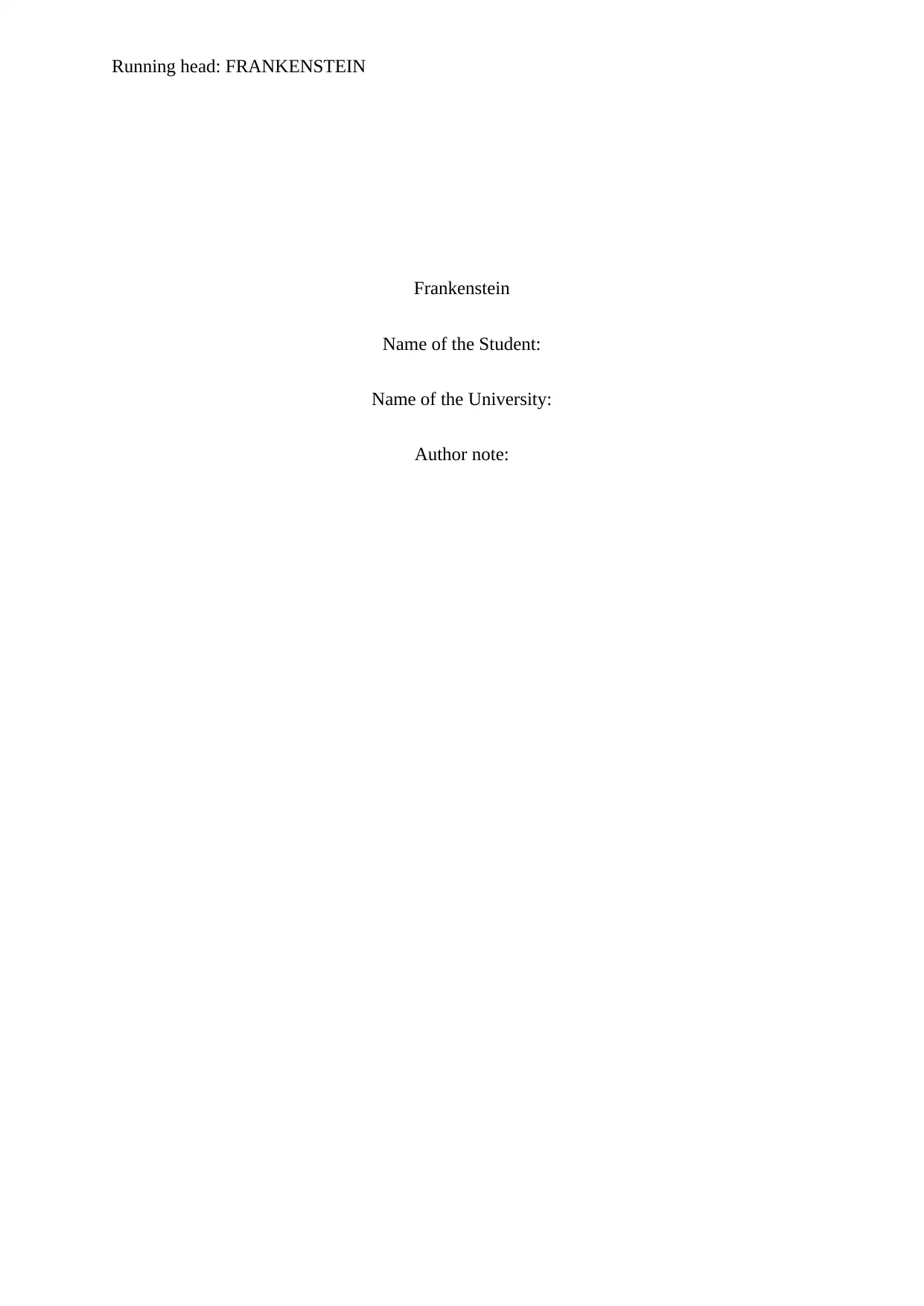
Running head: FRANKENSTEIN
Frankenstein
Name of the Student:
Name of the University:
Author note:
Frankenstein
Name of the Student:
Name of the University:
Author note:
Paraphrase This Document
Need a fresh take? Get an instant paraphrase of this document with our AI Paraphraser
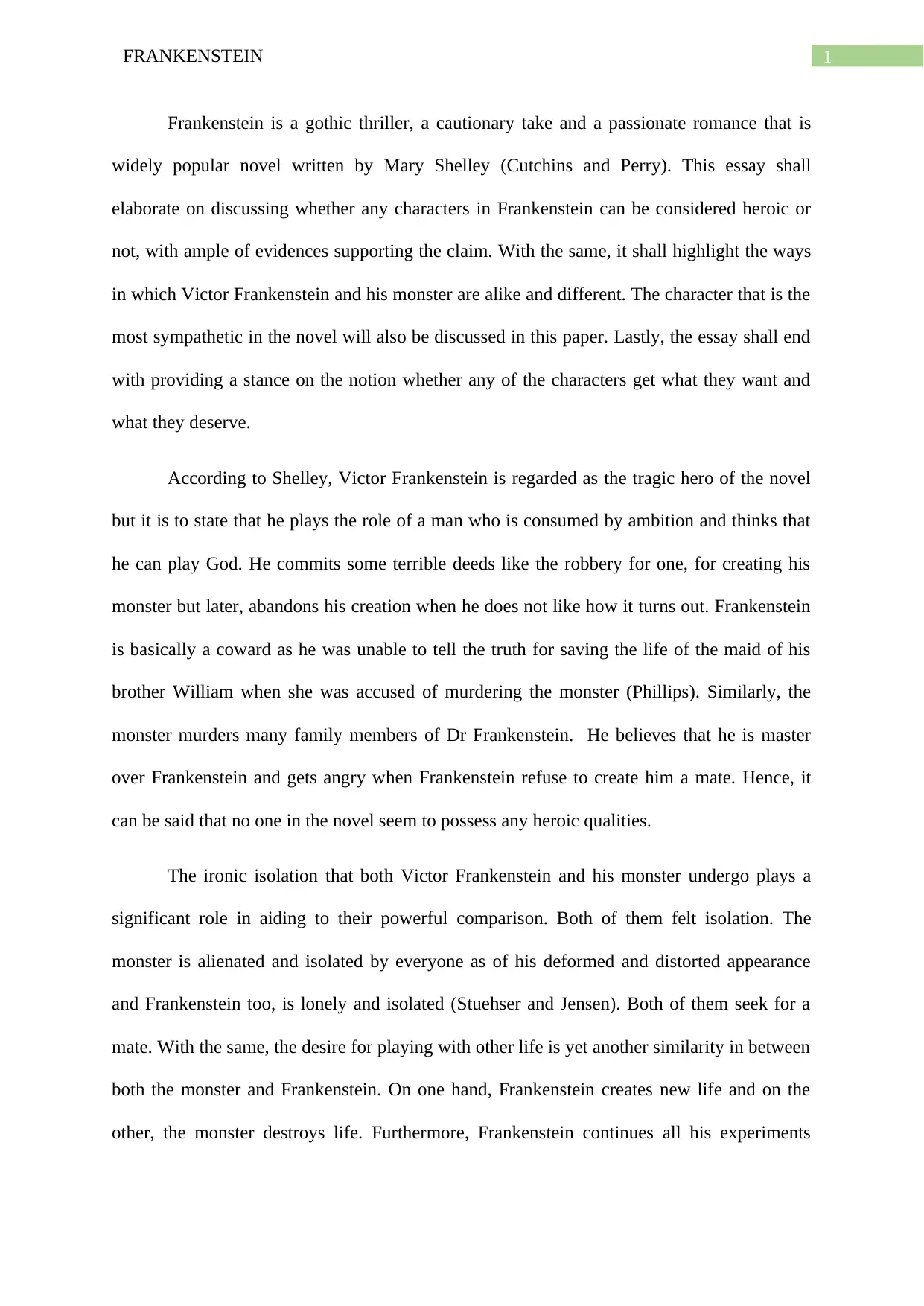
1FRANKENSTEIN
Frankenstein is a gothic thriller, a cautionary take and a passionate romance that is
widely popular novel written by Mary Shelley (Cutchins and Perry). This essay shall
elaborate on discussing whether any characters in Frankenstein can be considered heroic or
not, with ample of evidences supporting the claim. With the same, it shall highlight the ways
in which Victor Frankenstein and his monster are alike and different. The character that is the
most sympathetic in the novel will also be discussed in this paper. Lastly, the essay shall end
with providing a stance on the notion whether any of the characters get what they want and
what they deserve.
According to Shelley, Victor Frankenstein is regarded as the tragic hero of the novel
but it is to state that he plays the role of a man who is consumed by ambition and thinks that
he can play God. He commits some terrible deeds like the robbery for one, for creating his
monster but later, abandons his creation when he does not like how it turns out. Frankenstein
is basically a coward as he was unable to tell the truth for saving the life of the maid of his
brother William when she was accused of murdering the monster (Phillips). Similarly, the
monster murders many family members of Dr Frankenstein. He believes that he is master
over Frankenstein and gets angry when Frankenstein refuse to create him a mate. Hence, it
can be said that no one in the novel seem to possess any heroic qualities.
The ironic isolation that both Victor Frankenstein and his monster undergo plays a
significant role in aiding to their powerful comparison. Both of them felt isolation. The
monster is alienated and isolated by everyone as of his deformed and distorted appearance
and Frankenstein too, is lonely and isolated (Stuehser and Jensen). Both of them seek for a
mate. With the same, the desire for playing with other life is yet another similarity in between
both the monster and Frankenstein. On one hand, Frankenstein creates new life and on the
other, the monster destroys life. Furthermore, Frankenstein continues all his experiments
Frankenstein is a gothic thriller, a cautionary take and a passionate romance that is
widely popular novel written by Mary Shelley (Cutchins and Perry). This essay shall
elaborate on discussing whether any characters in Frankenstein can be considered heroic or
not, with ample of evidences supporting the claim. With the same, it shall highlight the ways
in which Victor Frankenstein and his monster are alike and different. The character that is the
most sympathetic in the novel will also be discussed in this paper. Lastly, the essay shall end
with providing a stance on the notion whether any of the characters get what they want and
what they deserve.
According to Shelley, Victor Frankenstein is regarded as the tragic hero of the novel
but it is to state that he plays the role of a man who is consumed by ambition and thinks that
he can play God. He commits some terrible deeds like the robbery for one, for creating his
monster but later, abandons his creation when he does not like how it turns out. Frankenstein
is basically a coward as he was unable to tell the truth for saving the life of the maid of his
brother William when she was accused of murdering the monster (Phillips). Similarly, the
monster murders many family members of Dr Frankenstein. He believes that he is master
over Frankenstein and gets angry when Frankenstein refuse to create him a mate. Hence, it
can be said that no one in the novel seem to possess any heroic qualities.
The ironic isolation that both Victor Frankenstein and his monster undergo plays a
significant role in aiding to their powerful comparison. Both of them felt isolation. The
monster is alienated and isolated by everyone as of his deformed and distorted appearance
and Frankenstein too, is lonely and isolated (Stuehser and Jensen). Both of them seek for a
mate. With the same, the desire for playing with other life is yet another similarity in between
both the monster and Frankenstein. On one hand, Frankenstein creates new life and on the
other, the monster destroys life. Furthermore, Frankenstein continues all his experiments
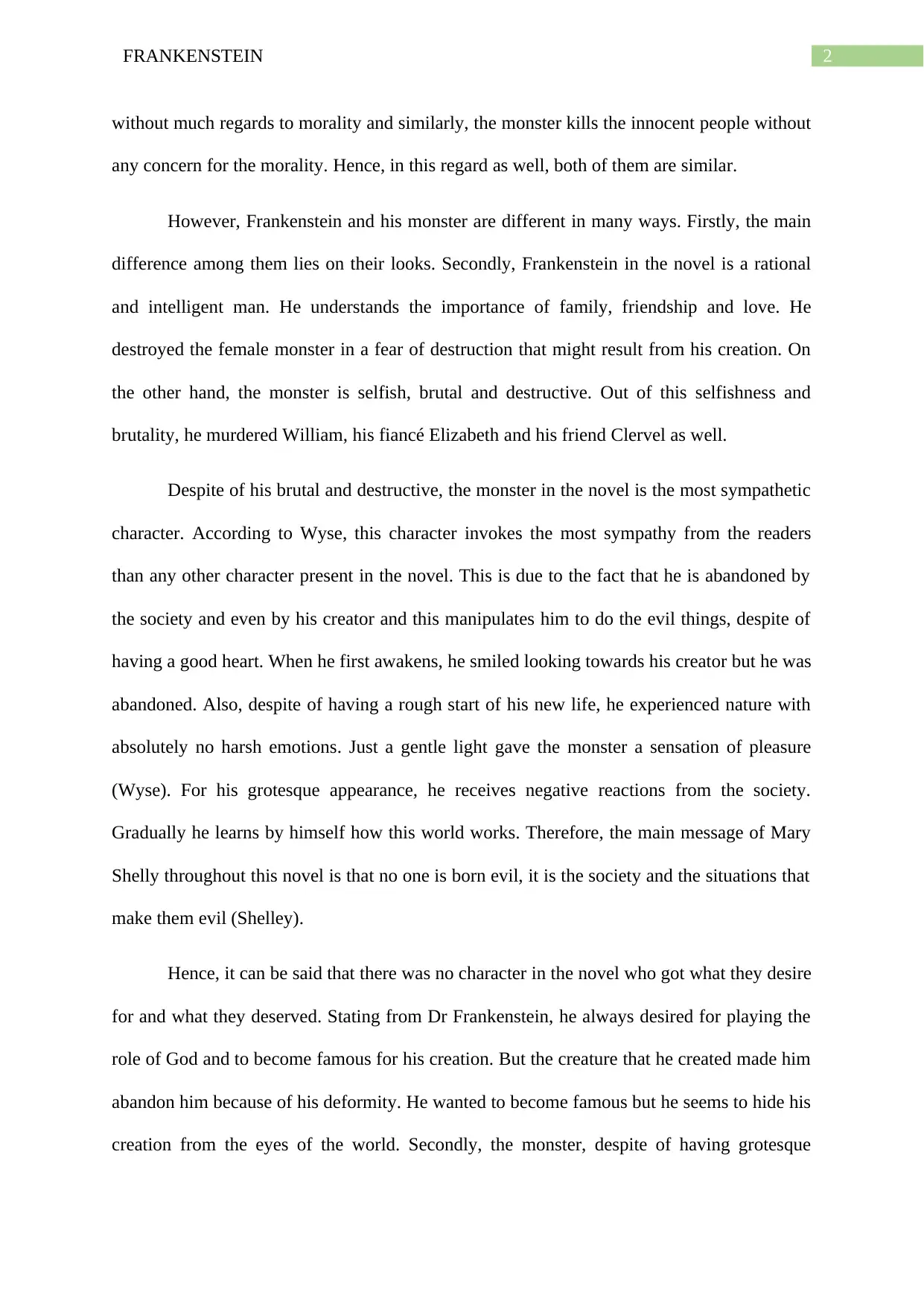
2FRANKENSTEIN
without much regards to morality and similarly, the monster kills the innocent people without
any concern for the morality. Hence, in this regard as well, both of them are similar.
However, Frankenstein and his monster are different in many ways. Firstly, the main
difference among them lies on their looks. Secondly, Frankenstein in the novel is a rational
and intelligent man. He understands the importance of family, friendship and love. He
destroyed the female monster in a fear of destruction that might result from his creation. On
the other hand, the monster is selfish, brutal and destructive. Out of this selfishness and
brutality, he murdered William, his fiancé Elizabeth and his friend Clervel as well.
Despite of his brutal and destructive, the monster in the novel is the most sympathetic
character. According to Wyse, this character invokes the most sympathy from the readers
than any other character present in the novel. This is due to the fact that he is abandoned by
the society and even by his creator and this manipulates him to do the evil things, despite of
having a good heart. When he first awakens, he smiled looking towards his creator but he was
abandoned. Also, despite of having a rough start of his new life, he experienced nature with
absolutely no harsh emotions. Just a gentle light gave the monster a sensation of pleasure
(Wyse). For his grotesque appearance, he receives negative reactions from the society.
Gradually he learns by himself how this world works. Therefore, the main message of Mary
Shelly throughout this novel is that no one is born evil, it is the society and the situations that
make them evil (Shelley).
Hence, it can be said that there was no character in the novel who got what they desire
for and what they deserved. Stating from Dr Frankenstein, he always desired for playing the
role of God and to become famous for his creation. But the creature that he created made him
abandon him because of his deformity. He wanted to become famous but he seems to hide his
creation from the eyes of the world. Secondly, the monster, despite of having grotesque
without much regards to morality and similarly, the monster kills the innocent people without
any concern for the morality. Hence, in this regard as well, both of them are similar.
However, Frankenstein and his monster are different in many ways. Firstly, the main
difference among them lies on their looks. Secondly, Frankenstein in the novel is a rational
and intelligent man. He understands the importance of family, friendship and love. He
destroyed the female monster in a fear of destruction that might result from his creation. On
the other hand, the monster is selfish, brutal and destructive. Out of this selfishness and
brutality, he murdered William, his fiancé Elizabeth and his friend Clervel as well.
Despite of his brutal and destructive, the monster in the novel is the most sympathetic
character. According to Wyse, this character invokes the most sympathy from the readers
than any other character present in the novel. This is due to the fact that he is abandoned by
the society and even by his creator and this manipulates him to do the evil things, despite of
having a good heart. When he first awakens, he smiled looking towards his creator but he was
abandoned. Also, despite of having a rough start of his new life, he experienced nature with
absolutely no harsh emotions. Just a gentle light gave the monster a sensation of pleasure
(Wyse). For his grotesque appearance, he receives negative reactions from the society.
Gradually he learns by himself how this world works. Therefore, the main message of Mary
Shelly throughout this novel is that no one is born evil, it is the society and the situations that
make them evil (Shelley).
Hence, it can be said that there was no character in the novel who got what they desire
for and what they deserved. Stating from Dr Frankenstein, he always desired for playing the
role of God and to become famous for his creation. But the creature that he created made him
abandon him because of his deformity. He wanted to become famous but he seems to hide his
creation from the eyes of the world. Secondly, the monster, despite of having grotesque
⊘ This is a preview!⊘
Do you want full access?
Subscribe today to unlock all pages.

Trusted by 1+ million students worldwide
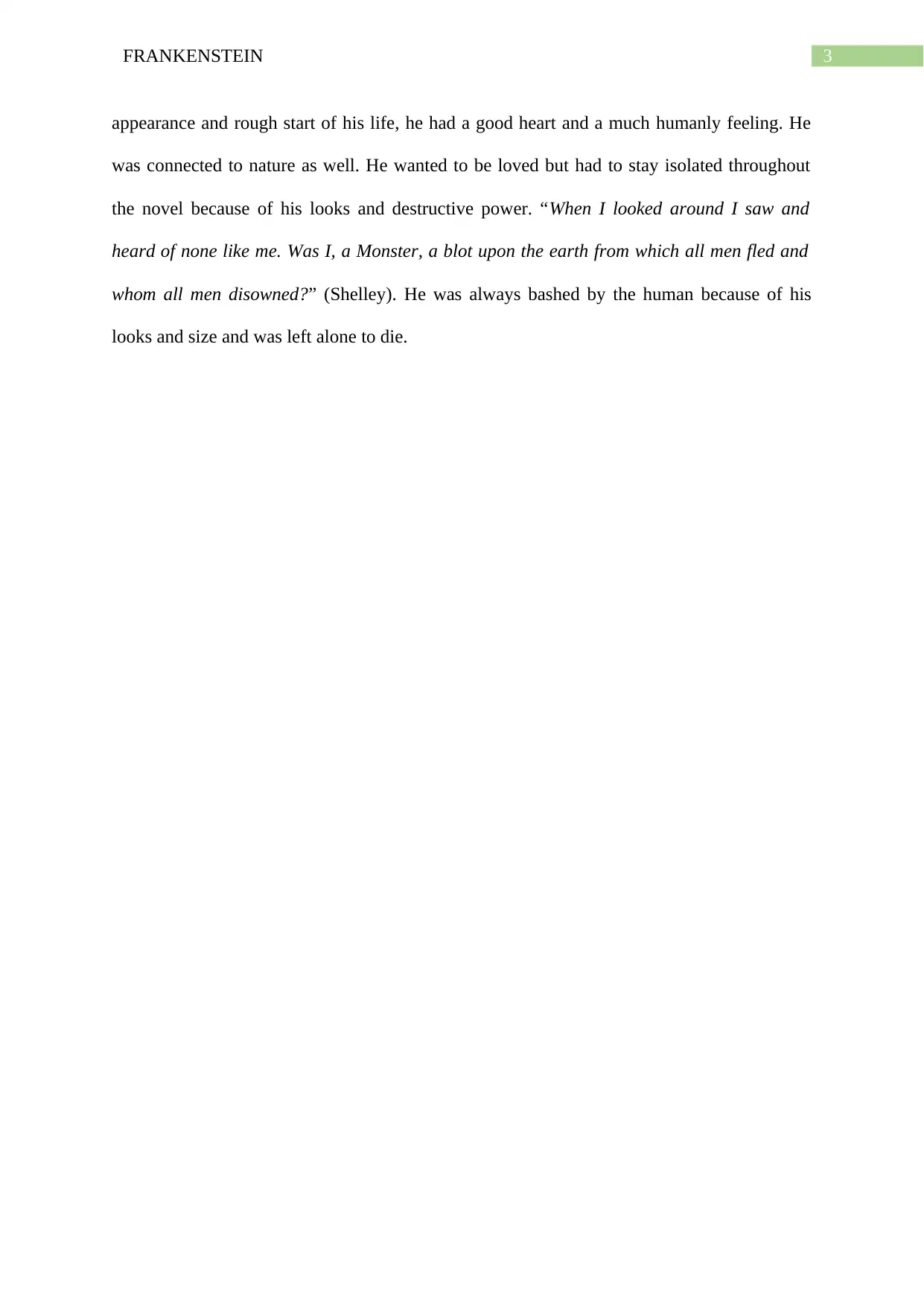
3FRANKENSTEIN
appearance and rough start of his life, he had a good heart and a much humanly feeling. He
was connected to nature as well. He wanted to be loved but had to stay isolated throughout
the novel because of his looks and destructive power. “When I looked around I saw and
heard of none like me. Was I, a Monster, a blot upon the earth from which all men fled and
whom all men disowned?” (Shelley). He was always bashed by the human because of his
looks and size and was left alone to die.
appearance and rough start of his life, he had a good heart and a much humanly feeling. He
was connected to nature as well. He wanted to be loved but had to stay isolated throughout
the novel because of his looks and destructive power. “When I looked around I saw and
heard of none like me. Was I, a Monster, a blot upon the earth from which all men fled and
whom all men disowned?” (Shelley). He was always bashed by the human because of his
looks and size and was left alone to die.
Paraphrase This Document
Need a fresh take? Get an instant paraphrase of this document with our AI Paraphraser
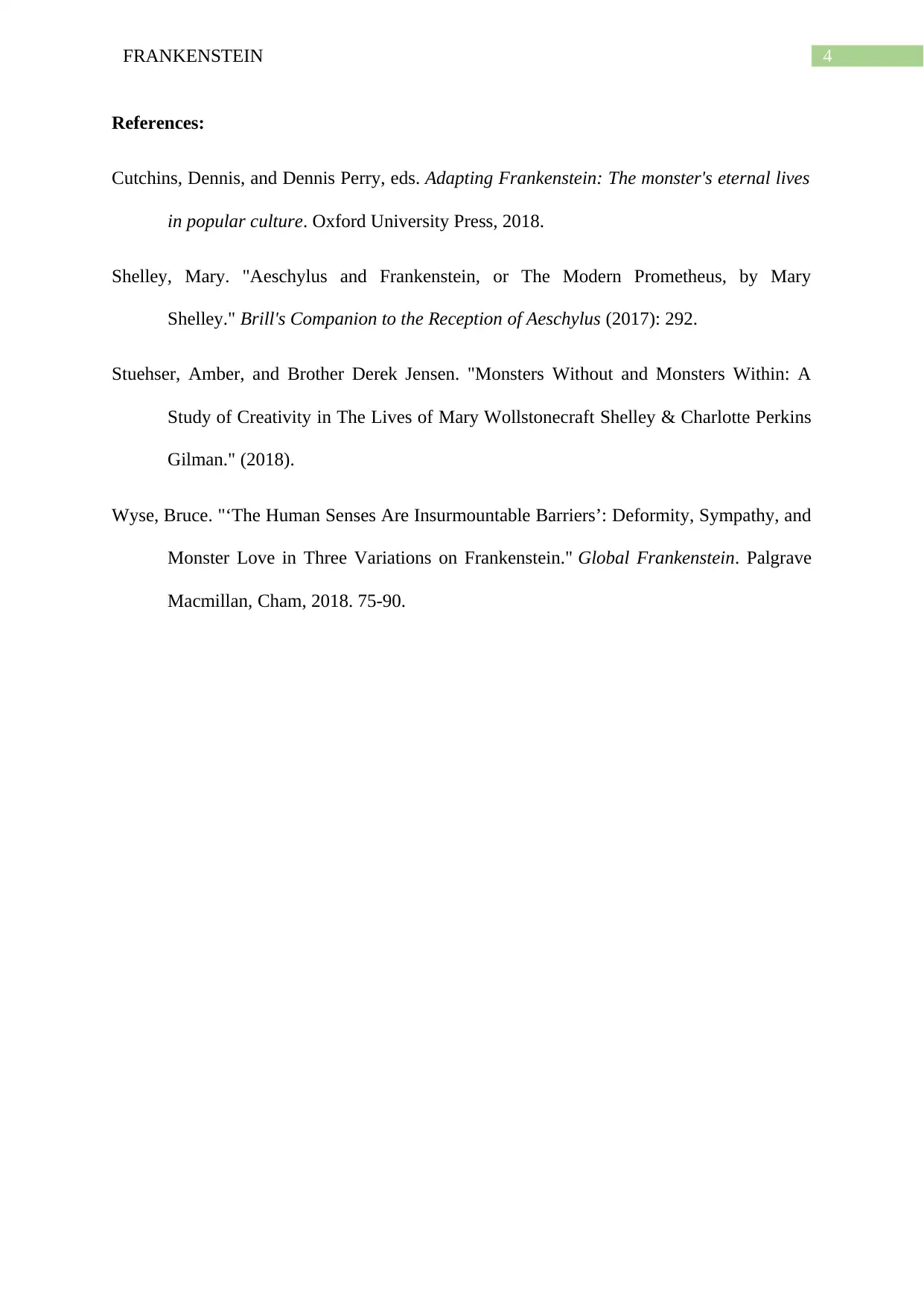
4FRANKENSTEIN
References:
Cutchins, Dennis, and Dennis Perry, eds. Adapting Frankenstein: The monster's eternal lives
in popular culture. Oxford University Press, 2018.
Shelley, Mary. "Aeschylus and Frankenstein, or The Modern Prometheus, by Mary
Shelley." Brill's Companion to the Reception of Aeschylus (2017): 292.
Stuehser, Amber, and Brother Derek Jensen. "Monsters Without and Monsters Within: A
Study of Creativity in The Lives of Mary Wollstonecraft Shelley & Charlotte Perkins
Gilman." (2018).
Wyse, Bruce. "‘The Human Senses Are Insurmountable Barriers’: Deformity, Sympathy, and
Monster Love in Three Variations on Frankenstein." Global Frankenstein. Palgrave
Macmillan, Cham, 2018. 75-90.
References:
Cutchins, Dennis, and Dennis Perry, eds. Adapting Frankenstein: The monster's eternal lives
in popular culture. Oxford University Press, 2018.
Shelley, Mary. "Aeschylus and Frankenstein, or The Modern Prometheus, by Mary
Shelley." Brill's Companion to the Reception of Aeschylus (2017): 292.
Stuehser, Amber, and Brother Derek Jensen. "Monsters Without and Monsters Within: A
Study of Creativity in The Lives of Mary Wollstonecraft Shelley & Charlotte Perkins
Gilman." (2018).
Wyse, Bruce. "‘The Human Senses Are Insurmountable Barriers’: Deformity, Sympathy, and
Monster Love in Three Variations on Frankenstein." Global Frankenstein. Palgrave
Macmillan, Cham, 2018. 75-90.
1 out of 5
Related Documents
Your All-in-One AI-Powered Toolkit for Academic Success.
+13062052269
info@desklib.com
Available 24*7 on WhatsApp / Email
![[object Object]](/_next/static/media/star-bottom.7253800d.svg)
Unlock your academic potential
Copyright © 2020–2026 A2Z Services. All Rights Reserved. Developed and managed by ZUCOL.




